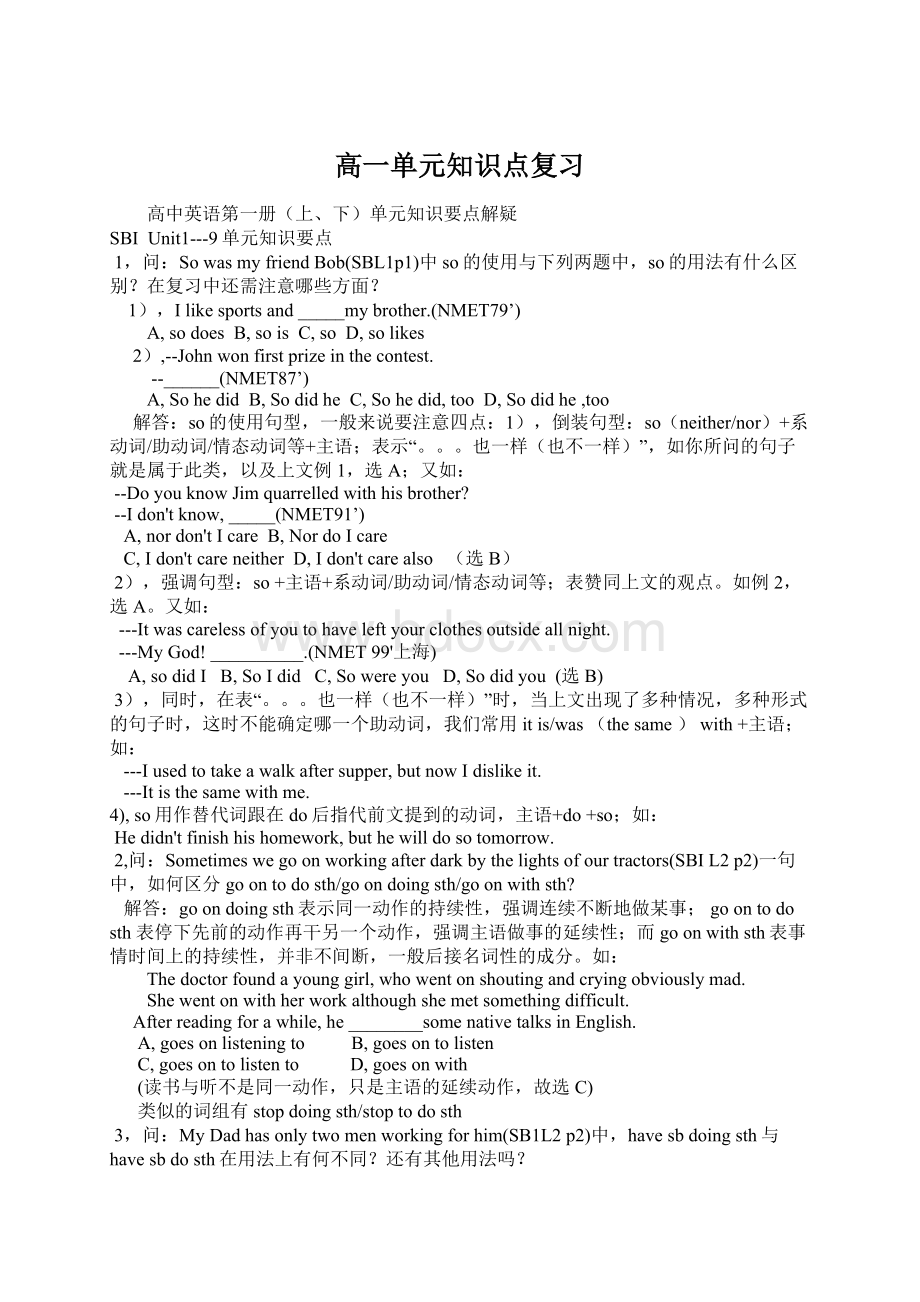高一单元知识点复习.docx
《高一单元知识点复习.docx》由会员分享,可在线阅读,更多相关《高一单元知识点复习.docx(42页珍藏版)》请在冰豆网上搜索。

高一单元知识点复习
高中英语第一册(上、下)单元知识要点解疑
SBI Unit1---9单元知识要点
1,问:
SowasmyfriendBob(SBL1p1)中so的使用与下列两题中,so的用法有什么区别?
在复习中还需注意哪些方面?
1),Ilikesportsand_____mybrother.(NMET79’)
A,sodoes B,sois C,so D,solikes
2),--Johnwonfirstprizeinthecontest.
--______(NMET87’)
A,Sohedid B,Sodidhe C,Sohedid,too D,Sodidhe,too
解答:
so的使用句型,一般来说要注意四点:
1),倒装句型:
so(neither/nor)+系动词/助动词/情态动词等+主语;表示“。
。
。
也一样(也不一样)”,如你所问的句子就是属于此类,以及上文例1,选A;又如:
--DoyouknowJimquarrelledwithhisbrother?
--Idon'tknow,_____(NMET91’)
A,nordon'tIcare B,NordoIcare
C,Idon'tcareneither D,Idon'tcarealso (选B)
2),强调句型:
so+主语+系动词/助动词/情态动词等;表赞同上文的观点。
如例2,选A。
又如:
---Itwascarelessofyoutohaveleftyourclothesoutsideallnight.
---MyGod!
__________.(NMET99'上海)
A,sodidI B,SoIdid C,Sowereyou D,Sodidyou (选B)
3),同时,在表“。
。
。
也一样(也不一样)”时,当上文出现了多种情况,多种形式的句子时,这时不能确定哪一个助动词,我们常用itis/was(thesame)with+主语;如:
---Iusedtotakeawalkaftersupper,butnowIdislikeit.
---Itisthesamewithme.
4),so用作替代词跟在do后指代前文提到的动词,主语+do+so;如:
Hedidn'tfinishhishomework,buthewilldosotomorrow.
2,问:
Sometimeswegoonworkingafterdarkbythelightsofourtractors(SBIL2p2)一句中,如何区分goontodosth/goondoingsth/goonwithsth?
解答:
goondoingsth表示同一动作的持续性,强调连续不断地做某事;goontodosth表停下先前的动作再干另一个动作,强调主语做事的延续性;而goonwithsth表事情时间上的持续性,并非不间断,一般后接名词性的成分。
如:
Thedoctorfoundayounggirl,whowentonshoutingandcryingobviouslymad.
Shewentonwithherworkalthoughshemetsomethingdifficult.
Afterreadingforawhile,he________somenativetalksinEnglish.
A,goesonlisteningto B,goesontolisten
C,goesontolistento D,goesonwith
(读书与听不是同一动作,只是主语的延续动作,故选C)
类似的词组有stopdoingsth/stoptodosth
3,问:
MyDadhasonlytwomenworkingforhim(SB1L2p2)中,havesbdoingsth与havesbdosth在用法上有何不同?
还有其他用法吗?
答:
这是使役动词的用法,havesbdoingsth表让某人持续某一种动作状态,havesbdosth表一次性动作,如:
Whydoyouhavethetapwaterrunningallthetime?
Acomputerdoesonlywhatthinkingpeople________(NMET99'上海)
A,haveitdo B,haveitdone
C,havedoneit D,havingitdone
"计算机只是按人们让它思维的方式思考”,选A。
另外,还要掌握区分与运用getsbtodosth/havesthdone/havesthtodo,getsbtodosth为“让某人干某事”;havesthdone“让。
。
。
被做”;havesthtodo“有事要做”;如:
Canyoutrytogetthemtobringdowntheprice?
(SBIL33)
ThisSaturdayI'llhavesomethingimportanttodo.("有重要的事要做”)
---Goodmorning,canIhelpyou?
---I'dliketohavethispackage_______,madam.(NMET89')
A,beweighted B,tobeweighted C,toweighed D,weighed
(让人秤包裹,havesthdone,选D)
---Ican'tgetmycar______oncoldmorning.
---Haveyoutried_______theradiatorwithhotwater?
A,started,tofill B,starting,tofill
C,start,filling D,tostart,filling
(让车启动,getsbtodosth,选D)
4,问:
Themixturetastedterrible(SBIL6p6)中taste为半系动词,高中阶段我们学过的这类词有哪些?
答:
在高考的复习中,我们一般需要掌握下列这些系动词或半系动词,如:
feel,smell,sound,turn,grow,become,get,go,remain,stay,keep,look,seem,appear,fall等。
在运用中主要注意系表结构的用法,如:
Thiskindofcakelooks______,smells______andtastes________.
A,good,well,good B,well,good,well
C,good,good,good D,good,well,well
(三空均为系表结构,都要用形容词,故选C)
Cleaningwomeninbigcitiesusuallyget______bythehour.(NMET98')
A,pay B,paying C,paid D,topay
(从非谓语角度,是过去分词的用法;从被动角度是被动运用;从系表角度为系表;故选C)
5,问:
Don'ttouchanythingunlessyourteachertellsyouto.(SBIL5p5)中unless与until能互换吗?
他们有何区别?
答:
until意为“直到”,通常与not构成not。
。
。
until“直到。
。
。
才。
。
。
”,引导一个时间状语从句或作时间介词;unless表“如果不。
。
。
”,相当于if。
。
。
not,引导一个条件状语从句。
因此,此句不能换成until。
如:
Youwillbelate________youleaveimmediately.(NMET97')
A,unless B,until C,if D,or
("你将迟到,除非立即走”,立即走是不迟到的条件,故选A)
Youwillsucceedintheend________yougiveuphalfway(NMET2001'上海春)
A,evenif B,asthough C,aslongas D,unless
(成功的条件为中途不能放弃,只有unless含not之意,故选D)
Don'taskformorebooks_________youhavefinished.
A,unless B,aslongas C,until D,or
(“读完后再要书”,有一个时间先后,再兼顾not。
。
。
until结构,故选C)
6,问:
请讲讲Noneofyouwatchedcarefullyenough(SBIL6p6)中none与noone的具体区分与运用。
答:
先请看下例:
Theywereallverytiredbut______ofthemwouldstoptohavearest.(96')
A,any B,some C,none D,neither
None与noone主要区别在于:
none表示人或物,可接of短语,其用法相当于everyone;noone只表人,不接of短语,其用法相当于everyone.故上例选C.如:
There’refaultsfromwhichnoneofusis(are)free.None表示人或物,作主语谓语单复数均可;(Noone如用of短语表“连一个也不”之义:
Nooneofyoucouldliftit)在用法上,还要注意细致的不同,试比较:
---Who'sintheclassroom?
----None (F)
---Nobody/noone. (T) (回答who,what的问句一般不用none。
)
---Howmanyexerciseshaveyoufinished?
---Noone. (F)
---None. (T)
再看几道高考题:
(1),Aswewereasleep,_____ofusheardthesound.(NMET87')
A,both B,either C,none D,any
(2),Theywereallverytiredbut______ofthemwouldstoptohave
arest.(NMET96')
A,any B,some C,none D,neither
(3),Wecouldn'teatinarestaurantbecause______of us
had______moneyonus.(NMET91')
A,all,on B,any,no C,none,any D,noone,any
从结构上就可确定二者的不同,故上面的答案均选C。
7,问:
Isanybodyseeingyouoff?
Myplaneleavesatseven.(SBIL13p13)这两句中,为何不用be goingtodo?
是什么用法?
答:
趋向动词come,go, leave,begin,start,return,…等的一般现在时和进行时通常表安排或计划好的将来动作,如:
He returnshomenextSunday.
Thebusstartsat8:
00.
--When______you_____forLondon.
--Nextweek.
A,do,leave B,are,leaving
C,will,leave D,did,leave
I'vewonaholidayfortwotoFlorida.I_________mymum.(NMET2001'上海春)
A,amtaking B,havetaken C,take D,willhavetaken
上述两题都是考查趋向动词表将来的用法。
因此前题选B,后句选A。
8,问:
Icouldseenothingexceptagreatfireandlotsofsmoke(SBIL14p14)如何区分except,besides,exceptfor与exceptthat?
答:
在意义上都是“除了。
。
。
之外”,但except是表除开,不计算在内,即减去之意;besides则相反,表除了。
。
。
外还有。
。
。
,包括在内即相加。
如:
BesidesEnglish,IcanspeakalittleJapaneseandRussian.
(包括English)
AllofuswenttoseeafilmTitanicexceptBob.(Bob不在内)
exceptfor主要是指整体中的其中一部分即相属关系。
如:
Mary'sstudyisveryexcellentexceptforherhandwriting.
exceptthat主要是引导一个从属句。
如:
Thesuitfittedhimwell___________thecolourwasalittlebrighter. (NMET2000'上海春)
A,exceptfor B,exceptthat C,exceptwhen D,besides (选B)
9,问:
I'llkeeptheboxintheshadesothatthesundoesn'tburnthelittleplants.(SBIL17p17)中,sothat与so。
。
。
that用法有何区分?
答:
一,sothat和inorderthat一般引导一个目的状语从句,表“以便”
“为了”;如:
Shesavedhermoney_______shemightbuyacolorTVset.
A,sothat B,because C,if D,though
"节约钱的目的是为了买彩电”,表目的,选A。
也可以用inorderto和soasto接不定式表目的,如:
Peoplehadtowalkmanykilometresinordertofetchwood.(SBIL18)
二,So/Such…that引导一个结果状语从句,“如此。
。
。
以致。
。
。
”之义,如:
HisEnglishinoneofthesearticleswassogoodthatEngelswrotehimaletterandpraisedhimforit.(L82)
其结构变化如下:
1),So+形/副词+that
Such+形+名词(不可数或可数复数)+that
Thiswassuchgoodadvicethatweshouldacceptitimmediately.
2),So+形+单数可数名词+that
Such+a/an+形+单数可数名词+that
Hetellssomovingastorythatallofusaremovedtotears.
当被修饰的形容词表示“多”或“少”这个概念如many/much/little/few..则只用So…that:
Shehadsomanynovelsthatshedidn'tknowwhichoneto readfirst.
3),So+动词/过去分词(被动)+that
Itsohappenedthatwemeteachotherattheairportagain.
如此碰巧我们又在机场见面了。
4),如果把so/such放在句首强调so所带的部分,则句子要使用倒装:
Sobadlywashewoundedinthebattlethathewasstillinhospital.
10,问:
Thebuildingofanewcarfactorywasagreedonlastmonth.(SBIL22p22)请谈谈agree的全面用法。
答:
动词agree用法很多,常见的用法有:
1),Agree接不定式,agreetodosth “愿意/同意协助干…”
Jackagreed_______helpMarywithherlessons.
A,to B,with C,on D,/ (选A)
2),接从句,agreethat…“同意…”
3),agreeto(介词)sth 接表计划、安排、建议、意见等名词;如:
Idon'tagree________yourgoingtoBeijing.
A,to B,with C,on D,in (选A)
agreewithsb 同意某人的意见;后接人;也可接意见、看法等;
不用于被动结构。
也可指气候或食物等适合某人;或表什么与之相符或相配。
如:
Theclimatedoesn'tagreewithme.
我不适应这种气候。
YourstoryagreeswithwhatIhadalreadyheard.
你所说的与我听说的相符。
Iagree______youbutI'msorryIcan'tgiveyouanyhelp.
A,to B,on C,with D,about (选C)
agreeon/about…“就。
。
。
起得一致意见”,主语一般为复数形式。
由此可构成agreewithsbon/aboutsth.
Thedateofthemeeting_______.
A,hasnotbeenagreedon B,hasnotagreedon
C,agreedupon D,hasnotbeenagreed (选A)
11,问:
Wethinkthatourschoolswillbecomeevenbetter.(SBIL22,p22)中,evenbetter是什么用法?
请予归纳。
答:
在形容词和副词的比较级和最高级中,一些词修饰比较级或最高级,表程度的加深如:
Abit,alittle,rather,much,many,far,byfar,alot,lots,agreatdeal,any,still,even,yet,…而Byfar,much,nearly,almost,notreally,ever,first,yet…可修饰最高级。
如:
Nowitismucheasiertomakeplansforyourtrips.(SBIL34)
Wealsobelievethatmanymorepeoplewillprefertotravelbyair.(SBIL34) 再看几道高考题:
---Areyoufeeling_______?
----Yes.I’mfinenow.(97’)
A,anywell B,anybetter C,quitegood D,quitebetter
析:
quite不能修饰比较级,any修饰比较级表“好多了”选B.
You’restandingtoonearthecamera.Canyoumove ______?
(NMET2000’上海)
A,abitfar B,alittlefarther
C,abitoffarther D,alittlefar
析:
alittle修饰比较级表程度的加深,选B;C应用abit。
12,问:
alargenumberofbuildingswereburnt.Thenumberofpeoplewholosthomesreachesasmanyas250,000.(SBIL26)中anumberof与thenumberof用法有何区分?
答:
这两个短语主要的区别在于数的表达上,anumberof表“许多”谓语为复数;thenumberof表“。
。
。
的数量”,谓语用单数;共同点是它们都接可数名词的复数。
如:
Thenumberofpeopleinvited_______fifty,butanumberofthem_______a